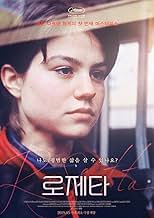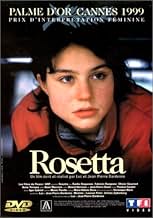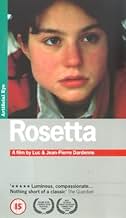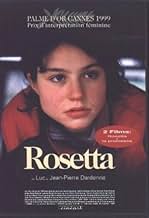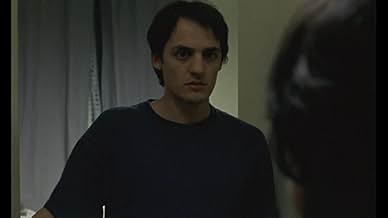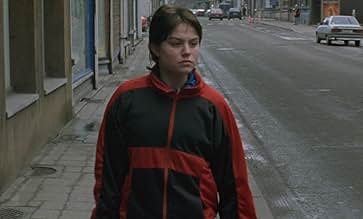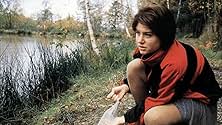IMDb-BEWERTUNG
7,4/10
16.601
IHRE BEWERTUNG
Die junge und impulsive Rosetta lebt bei ihrer alkoholkranken Mutter und tut aus Verzweiflung alles, um einen Job zu behalten.Die junge und impulsive Rosetta lebt bei ihrer alkoholkranken Mutter und tut aus Verzweiflung alles, um einen Job zu behalten.Die junge und impulsive Rosetta lebt bei ihrer alkoholkranken Mutter und tut aus Verzweiflung alles, um einen Job zu behalten.
- Regie
- Drehbuch
- Hauptbesetzung
- Auszeichnungen
- 10 Gewinne & 7 Nominierungen insgesamt
Leon Michaux
- First Policeman
- (as Léon Michaux)
Empfohlene Bewertungen
This film relies mainly on one camera to capture every little action and detail of the lead character, Rosetta, especially in her reactions to the despair she suffers throughout the film. I caught this one on IFC on May 23rd. The acting is so realistic, it is hard to imagine that the story is fictional and is shot in a documentary type style, where the hand held camera follows the actors, sneaks glimpses of their world in much the same way an ENG crew would on a story about poverty in a small European town where the economy is so bad there is little one can do to survive outside of desperate acts. In this case, Rosetta, the young girl with an alcoholic mother, lives in a trailer with no heat, has to sell re-sewn clothes to make a meager existence until she finally sees an opportunity open up for a job selling waffles at a small stand in a high traffic part of town. A young man who works there is smitten with her and offers to split some earnings from selling waffles he makes outside of his boss's knowledge. To tell you what happens next would give away the rest, but suffice to say this film is bitterly realistic, terribly sad and the ending is rather sudden but it shows some promise for the characters. The movie is shot with almost no budget, but some great camera work, some scenes a little long but edited fairly well, no music, and subtitles under the French dialog. It deserves awards for telling a very credible story demonstrating hardship of the poor in Europe and what measures one has to take to survive. I was deeply moved and driven to weep during painful scenes of the lead character's despair and what seems to be a hopeless situation. The character is genuinely portrayed by a young actress from Belgium performing extremely well for her first film role. Fine work by director and cast.
I saw "Rosetta" several weeks ago - and I still fail to recall any movie which could convey such an immediate sense of being pysically there, all the time along Rosetta's everydays' "war". We are bombarded and flooded with images 16hours per day, it takes great stregth of vision, of images, atmosphere and characters to grab at you this effectively in year 2000! Rosetta struck my as a very real encounter, with all the nonsense and ups / down of real events and life... It made me feel more of life, made me think of it more often and more intensely, it made me look into more eyes than I did before... Thank you, Luc and Jean-Pierre! and thank you, Emilie and all!
The Dardenne brothers were not incorrect when they called their Palme D'Or winning work "a war film.". It is an unremitting portrayal of the most dire hardships, centred around Rosetta (Emilie Dequenne), a young, spirited girl who battles with desperate tenacity to find a job and not so much escape as merely survive in her surroundings. Her life is a bleak struggle for subsistence in a world devoid of tenderness, in which her mother (Anne Yernaux), a quasi-prostitute more concerned with the source of her next drink than her daughter, stands as an example of the potential results of such continued deprivation. When she is befriended by a waffle vendor (Fabrizio Rongione), her prior existence leaves her unsure of how to act in the presence of an affectionate, concerned face, and when he attempts to teach her to dance, she can do no more than move jerkily without rhythm, uncomfortable in the arms of another human. The arisal of an opportunity to take his job forces Rosetta to confront whether physical necessity can ever be an excuse for the betrayal of others.
What follows is a superbly wrought piece of social realism, unsentimental in its examination of the dehumanising effects of poverty. For Rosetta and many others in analogous situations of the most dire physical hardship, their material deprivation leads to an erosion emotional and mental qualities. The Dardenne brothers' ruthless directional style, laced with close-ups and unpleasant details, tangibly conveys the dirt and drudgery of Rosetta's impoverished life. Indeed, the film is palpably cold, almost painfully explicit in its depiction of an uncaring world. In addition, Dardenne's performance, for which she won the Best Actress Award at Cannes, brings to life with understated excellence her fight, not to live well, but simply to survive by any means in a world that, for her, contains few hopes and no love.
The Dardenne brothers make no excuses or apologies for their presentation of Rosetta's base strivings, delivering a film that charts how far individuals can fall. Consistently raw and at times brutal, the film nevertheless proposes no answers, expects no sympathy, it merely conveys and evokes with a clear, uncompromising eye the bleak struggle for existence that is, for some, the total of what life has to offer. Harsh, but utterly compelling viewing.
What follows is a superbly wrought piece of social realism, unsentimental in its examination of the dehumanising effects of poverty. For Rosetta and many others in analogous situations of the most dire physical hardship, their material deprivation leads to an erosion emotional and mental qualities. The Dardenne brothers' ruthless directional style, laced with close-ups and unpleasant details, tangibly conveys the dirt and drudgery of Rosetta's impoverished life. Indeed, the film is palpably cold, almost painfully explicit in its depiction of an uncaring world. In addition, Dardenne's performance, for which she won the Best Actress Award at Cannes, brings to life with understated excellence her fight, not to live well, but simply to survive by any means in a world that, for her, contains few hopes and no love.
The Dardenne brothers make no excuses or apologies for their presentation of Rosetta's base strivings, delivering a film that charts how far individuals can fall. Consistently raw and at times brutal, the film nevertheless proposes no answers, expects no sympathy, it merely conveys and evokes with a clear, uncompromising eye the bleak struggle for existence that is, for some, the total of what life has to offer. Harsh, but utterly compelling viewing.
Sometimes you see a work of art and it knocks you out - it's all you can do for days and days to come to get it out of your mind. And you try to find a way in your mind to bring yourself closer to it, immerse yourself in it. You'll read everything about it that you can, try to find some more of the artist's work, find everything you can to do with it. All this to try and replicate the feeling that you experienced when you first encountered the piece. This is the effect that I've been trying to achieve since I saw Rosetta at 1999's London Film Festival.
Though some have attributed Rosetta's success at Cannes to the last-day syndrome; whereby the film that stays freshest in the panel's minds is the one that wins, it smacks of cavilling to suggest that this is the reason behind Rosetta's success - the simple fact is that it's a remarkable film which was only seriously rivalled this year by Almodovar's All About My Mother. Ignorance and snobbery have constantly been at work when Rosetta has been considered by critics, since it's a film which has divided the critics.
Top of the list of things-to-hate about Rosetta is the Dardennes' decision to shoot hand-held, an objection which I can understand but barely comprehend. Rosetta is a film which follows its heroine. Therefore, by mounting the camera almost on her shoulders, we see the world as she sees it, just as we see the world as she thinks it throughout the rest of the film. Most perfect is a scene when she is lying in bed at the house of Ricquet, her (only) friend, when she reassures herself that she's normal, she's found a friend, a *true* job and that she won't fall into the hole. Seldom is a more perfect and more touching marriage and explanation of the inner-self and its outer-conflicts achieved? - it's just magnificent cinema.
Rosetta is a fighter, but although her conflicts are with individuals, in a literal, physical sense, the metaphorical struggle is with the societal brick wall which she comes up against when trying to forge 'une vie normale' for herself. She's fighting against society for the right to live a life; she's fighting against society for a modicum of dignity. In this way, Rosetta is both existentialist and political, though never overtly, much to the credit of the Dardenne Brothers, since Rosetta is a 'universal' film.
The question which Rosetta poses is how we can release ourselves from the trouble we are in. Rosetta believes, and has been taught to believe (ironically, by society) that the way that she can achieve this dignity is by getting a 'true' job - so much so that she phones her boss to tell him that she won't be at work before her suicide attempt. She doesn't see that it's through Ricquet, not through having a job (his job) that she stands the best chance of forging a true identity, a true life and true dignity.
Rosetta is, in effect, just a proletarian hero, fighting society for the right to live and the right to work. However, to see the film in this way is reductionist in the extreme and is self-defeating. Rosetta is, above all, an individual. Her victory is to see that she has a friend who was there all along, and this gives us a remarkable ending that is full of drama; packs a considerable emotional punch and is unforgettable, thanks especially to a stunningly naturalistic performance by Emilie Dequenne, who won an award at Cannes for her portrayal of Rosetta. Her interpretation of the eponymous heroine lends so much to the film that she is as much responsible for the brilliance of the film as the directors are.
This film will never be a hit with middle-class and middle-class, middle-brow critics it in the same way that Schindler's List and The English Patient were; the bourgeoisie never want to get their hands dirty. It's their loss; Rosetta is quite simply one of the most wonderful films you'll ever see.
Though some have attributed Rosetta's success at Cannes to the last-day syndrome; whereby the film that stays freshest in the panel's minds is the one that wins, it smacks of cavilling to suggest that this is the reason behind Rosetta's success - the simple fact is that it's a remarkable film which was only seriously rivalled this year by Almodovar's All About My Mother. Ignorance and snobbery have constantly been at work when Rosetta has been considered by critics, since it's a film which has divided the critics.
Top of the list of things-to-hate about Rosetta is the Dardennes' decision to shoot hand-held, an objection which I can understand but barely comprehend. Rosetta is a film which follows its heroine. Therefore, by mounting the camera almost on her shoulders, we see the world as she sees it, just as we see the world as she thinks it throughout the rest of the film. Most perfect is a scene when she is lying in bed at the house of Ricquet, her (only) friend, when she reassures herself that she's normal, she's found a friend, a *true* job and that she won't fall into the hole. Seldom is a more perfect and more touching marriage and explanation of the inner-self and its outer-conflicts achieved? - it's just magnificent cinema.
Rosetta is a fighter, but although her conflicts are with individuals, in a literal, physical sense, the metaphorical struggle is with the societal brick wall which she comes up against when trying to forge 'une vie normale' for herself. She's fighting against society for the right to live a life; she's fighting against society for a modicum of dignity. In this way, Rosetta is both existentialist and political, though never overtly, much to the credit of the Dardenne Brothers, since Rosetta is a 'universal' film.
The question which Rosetta poses is how we can release ourselves from the trouble we are in. Rosetta believes, and has been taught to believe (ironically, by society) that the way that she can achieve this dignity is by getting a 'true' job - so much so that she phones her boss to tell him that she won't be at work before her suicide attempt. She doesn't see that it's through Ricquet, not through having a job (his job) that she stands the best chance of forging a true identity, a true life and true dignity.
Rosetta is, in effect, just a proletarian hero, fighting society for the right to live and the right to work. However, to see the film in this way is reductionist in the extreme and is self-defeating. Rosetta is, above all, an individual. Her victory is to see that she has a friend who was there all along, and this gives us a remarkable ending that is full of drama; packs a considerable emotional punch and is unforgettable, thanks especially to a stunningly naturalistic performance by Emilie Dequenne, who won an award at Cannes for her portrayal of Rosetta. Her interpretation of the eponymous heroine lends so much to the film that she is as much responsible for the brilliance of the film as the directors are.
This film will never be a hit with middle-class and middle-class, middle-brow critics it in the same way that Schindler's List and The English Patient were; the bourgeoisie never want to get their hands dirty. It's their loss; Rosetta is quite simply one of the most wonderful films you'll ever see.
This is beyond the intensity of Gary Oldman's "Nil By Mouth", and Tim Roth's "The War Zone", while Erick Zonca's "Dreamlife of Angels" seems heavenly compared to the conditions presented in "Rosetta" by Luc and Jean-Pierre Dardenne.
A down right harsh film. Unsparingly direct depiction of a young girl's poverty struggle. She is as tough as she can be. She fights vigorously to hang on to a job. She cares for her mother, a helpless alcoholic, and a seamstress when not drunk. Rosetta (Emilie Dequenne) is unrelentingly stubborn about receiving kindness, or food unsolicited. She has her dignity. A young person with so much burden on her shoulder and a heavy heart.
Things may be seemingly repetitive: again and again we see her crossing that traffic roadway, jumping into the bush trail; we hear the rustling leaves, the thumping of her footsteps; we watch her stopping by the hideout where she kept her rubber boots, changing her only good pair of working shoes; we follow her as she crawls through the wire fence loophole, arriving at the campers -- feels like a mindless routine. Yet, she's intensely single-minded on getting "a real job" (vs. moonlighting) and to have "a normal life", not to "fell into a rut". At one point, we can almost be happy for her to have "found a friend" in Riquet (Fabrizio Rongione), a waffle street van vendor. She actually was able to peacefully sleep that night. Only to wake up and report at work to be told she's again out of a job. A devastating blow. Out of desperation, she did something that most of us viewers may not be able to comprehend -- but what do we know of her travails, who are we to judge her action?
It was not easy for her to have done what she did -- she did hesitate and took the risk. She risked her newfound friendship -- she desperately needed "to have a job". In a way, she has lack tenderness, love and warmth for so long that she's numb to human kindness -- she needs to be thawed! One has to be patient with her, to give her time and see through her tough surface and rekindle her heart. Trust needs to be rebuilt for her to continue living and tackle difficulties afresh!
This is no Hollywood fare. Dialogs are few. No exploitative, explosive, abusive scenes. We're given the bare structure of the story, and Rosetta, plus the sparing few supporting characters, held the movie steadily intact.
A down right harsh film. Unsparingly direct depiction of a young girl's poverty struggle. She is as tough as she can be. She fights vigorously to hang on to a job. She cares for her mother, a helpless alcoholic, and a seamstress when not drunk. Rosetta (Emilie Dequenne) is unrelentingly stubborn about receiving kindness, or food unsolicited. She has her dignity. A young person with so much burden on her shoulder and a heavy heart.
Things may be seemingly repetitive: again and again we see her crossing that traffic roadway, jumping into the bush trail; we hear the rustling leaves, the thumping of her footsteps; we watch her stopping by the hideout where she kept her rubber boots, changing her only good pair of working shoes; we follow her as she crawls through the wire fence loophole, arriving at the campers -- feels like a mindless routine. Yet, she's intensely single-minded on getting "a real job" (vs. moonlighting) and to have "a normal life", not to "fell into a rut". At one point, we can almost be happy for her to have "found a friend" in Riquet (Fabrizio Rongione), a waffle street van vendor. She actually was able to peacefully sleep that night. Only to wake up and report at work to be told she's again out of a job. A devastating blow. Out of desperation, she did something that most of us viewers may not be able to comprehend -- but what do we know of her travails, who are we to judge her action?
It was not easy for her to have done what she did -- she did hesitate and took the risk. She risked her newfound friendship -- she desperately needed "to have a job". In a way, she has lack tenderness, love and warmth for so long that she's numb to human kindness -- she needs to be thawed! One has to be patient with her, to give her time and see through her tough surface and rekindle her heart. Trust needs to be rebuilt for her to continue living and tackle difficulties afresh!
This is no Hollywood fare. Dialogs are few. No exploitative, explosive, abusive scenes. We're given the bare structure of the story, and Rosetta, plus the sparing few supporting characters, held the movie steadily intact.
Wusstest du schon
- WissenswertesContrary to popular belief, the film did not inspire a new so-called "Rosetta Law" in Belgium that prohibited employers from paying teen workers less than the minimum wage and included other youth labour reforms. In a Guardian interview with the Dardenne brothers, Jean-Pierre explained the misconception: "No, that law already existed, it just hadn't been voted through yet. The truth is always less interesting than the fiction."
- PatzerWhen Rosetta is giving her mother money for a water bill she is wearing a jacket with the sleeves fully extended. However in the next immediate cut when she goes outside the sleeves are rolled up.
- SoundtracksSomething New
Top-Auswahl
Melde dich zum Bewerten an und greife auf die Watchlist für personalisierte Empfehlungen zu.
- How long is Rosetta?Powered by Alexa
Details
- Erscheinungsdatum
- Herkunftsländer
- Offizieller Standort
- Sprache
- Auch bekannt als
- Розетта
- Drehorte
- Produktionsfirmen
- Weitere beteiligte Unternehmen bei IMDbPro anzeigen
Box Office
- Bruttoertrag in den USA und Kanada
- 266.665 $
- Eröffnungswochenende in den USA und in Kanada
- 20.187 $
- 7. Nov. 1999
- Weltweiter Bruttoertrag
- 293.092 $
Zu dieser Seite beitragen
Bearbeitung vorschlagen oder fehlenden Inhalt hinzufügen

![Bande-annonce [OV] ansehen](https://m.media-amazon.com/images/M/MV5BOWY4MGMzYTItZjQwOS00MmVhLWE0MDYtMGZmYmFjNTkyYTU2XkEyXkFqcGdeQXRyYW5zY29kZS13b3JrZmxvdw@@._V1_QL75_UX500_CR0)


